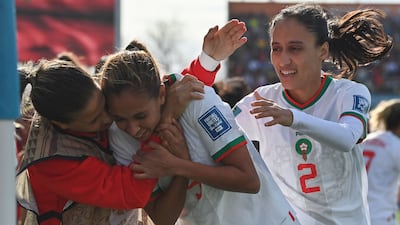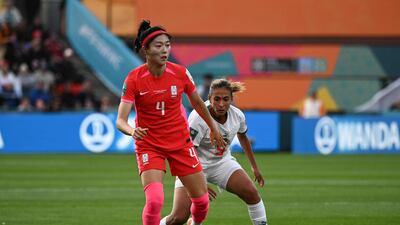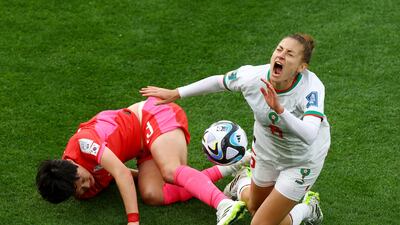It might be a cliche but just competing at this year’s Women’s World Cup was already a victory for Morocco.
Yet to actually win a game … that was something else altogether. That was history.
Following hot on the heels of their male counterparts, who stunned the world by making the semi-finals of the 2022 World Cup in Qatar, the Atlas Lionesses are out to prove that Morocco can be a force in the women’s game as well.
Morocco qualified for this year’s tournament by virtue of reaching the final of last year’s Women’s Africa Cup of Nations (Wafcon), which they also hosted.
In taking their place alongside the elite of the sport in Australia and New Zealand, they earned the distinction of becoming the first nation from the Arab world to qualify for women’s football’s marquee event.
“We are honoured to be the first Arab country to take part in the Women's World Cup," captain Ghizlane Chebbak told reporters before the tournament. "We feel that we have to shoulder a big responsibility to give a good image.”
Their debut against world No 2 Germany was one to forget, however, as they were on the wrong side of a 6-0 scoreline. The result exposed the gap between Europe and the rest of the world that now also increasingly exists in the women’s game, not just the men’s.
But against South Korea on a crisp winter’s day in Adelaide, when Ibtissam Jraidi’s glanced header found the back of the net in just the sixth minute, even more history was made as they registered not only their first goal, but also their first victory.
There were tears of joy on the pitch and in the stands, and no doubt countless more back in Morocco as the realisation of their achievement sunk in.
“As many Moroccans woke up to the news on Sunday, people started to understand that a win in a Women's World Cup was not something one should take for granted, but rather an accomplishment in itself,” Moroccan journalist Amine El Amri told The National.
That win means they go into their final group game – against already-qualified Colombia in Perth on Thursday (2pm UAE) – with a chance of making the last 16. Indeed, should they better Germany's result against South Korea, they will make even more history by qualifying for the knockout stages.
Although most people around the world are just becoming aware of Morocco’s involvement in the women’s game, this is not a chance qualification, rather the culmination of many years of investment and development.
“Exponential,” added El Amri, when asked about the growth of women’s football in Morocco.
“I can't see any other African nation involved in the women's game as much as Morocco. The Moroccan FA has a two-tier professional championship and pays the players' wages to encourage elite football.
“When it comes to results, the Under-17 national team made it to the World Cup in India in 2022 and the senior team reached the Wafcon final last summer, while local powerhouse AS FAR won the African Women's Champions' League back in December.
“If you add in top level coaching staff and a wide scouting policy, we can see that development is a constant aspect of the women's game in Morocco.”
Hosting last year’s Wafcon, which saw 45,000 supporters attend the final against South Africa, was a game changer, according to Chebbak.
“Things have changed since Wafcon," said the 32-year-old forward. "We managed to change society’s perception of women’s football at that tournament."
Back in Adelaide, a beaming Jraidi hailed their win over South Korea, ranked 55 places higher in the Fifa rankings, as a win not just for Morocco but a win for the entire Arab world.
That is particularly the case given the presence of 25-year-old defender Nouhaïla Benzina – the first Hijabi player to grace the field at a Women’s World Cup.
“For her, she’s just playing her game,” the former Lebanon international, Assile Toufaily, told The Asian Game Podcast. “But I think what she may not understand now is that in a few years time what she did in this tournament will play a huge role in the future of women’s football in the Middle East.
“What she is showing by playing on the biggest stage in the world at the World Cup, day after day, is that being a Hijabi isn’t a crime – it’s not something to be ashamed of. Putting on a Hijab can’t prevent you from doing what you love.”












